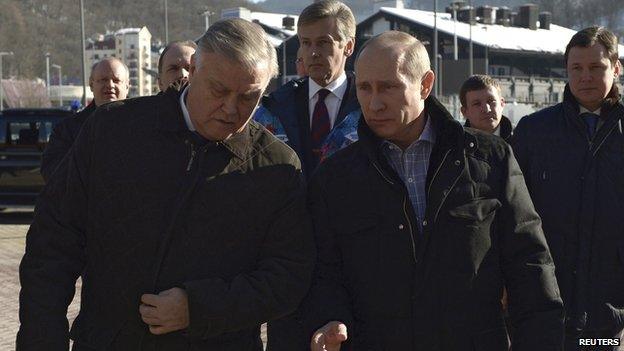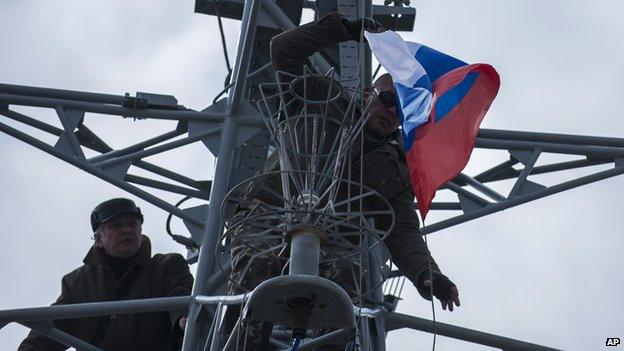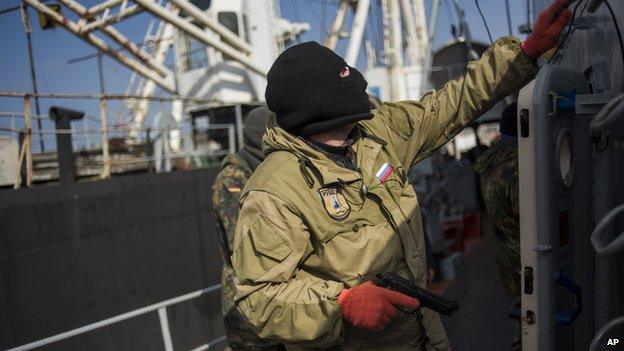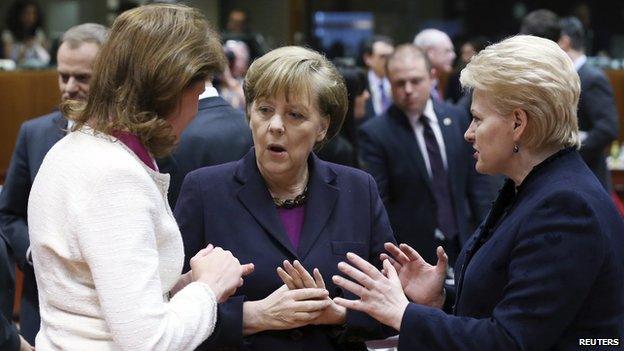Ukraine crisis: US sanctions target Putin's inner circle
- Published
President Obama: ''Nations do not redraw borders... simply because they are more powerful"
US President Barack Obama has announced further sanctions against Russia over its annexation of Crimea from Ukraine.
The measures target individuals closely associated with Russian President Vladimir Putin, as well as a bank, Rossiya, controlled by his allies.
Meanwhile EU leaders are meeting in Brussels amid warnings that they may impose tough economic sanctions.
Tensions are high as Moscow approves a treaty enabling Crimea - an autonomous republic in Ukraine - to join Russia.
Mr Obama said: "Russia must know that further escalation will only isolate it further from the international community."

Allies of the Russian president targeted by US sanctions include railways boss Vladimir Yakunin (left)
He said the US was watching the situation in southern and eastern Ukraine with concern.
Mr Obama also said he had signed an order enabling the US to impose sanctions on sectors of the Russian economy.
Russian authorities announced sanctions on US lawmakers and officials in response.
In a separate development in Crimea, Russian-allied troops have taken over at least two Ukrainian navy ships at anchor in the port of Sevastopol.
A Ukrainian defence ministry spokesman said at least 15 men were involved in the assault.
Inner circle
Among the 20 individuals facing the newly announced sanctions are members of Mr Putin's inner circle.
They include his chief of staff Sergei Ivanov and wealthy businessmen Arkady Rotenberg and Gennady Timchenko.
Those targeted will be unable to make transactions in dollars, will have any assets in the US frozen and will be barred from doing business in the US.
The BBC's Moscow correspondent Daniel Sandford says that between them the men on the list illustrate how President Putin runs Russia - using a tight circle of old friends whose loyalty is unquestioned, many of whom have a background in the security services.

The Ukrainian corvette Khmelnitsky was among those seized by pro-Russian forces on Thursday

The Khmelnitsky is anchored in the Crimean port of Sevastopol
European Union leaders meeting in Brussels also said they would expand the number of Russians facing sanctions, and said a summit with Russia planned for June would not go ahead.
German Chancellor Angela Merkel told the German parliament that the EU would be ready to impose economic sanctions against Russia if there were a further escalation in Russia's involvement in Ukraine.

EU leaders including Angela Merkel (centre) are in Brussels for talks on the Ukraine crisis
Mrs Merkel told reporters in Brussels that she was optimistic that EU nations would be able to present a unified voice on the Crimea crisis.
The EU and US introduced a first raft of sanctions against individual Russians and Ukrainians on Monday, a day after 97% of voters in a Crimean referendum opted to join Russia, according to Crimean authorities.
The US ordered the freezing of assets and travel bans on 11 individuals, while the EU imposed the same sanctions on 21 people.
Congressmen targeted
Russia has announced that it is imposing its own sanctions against US officials and politicians.
Among those targeted are some of the most senior Congressmen - Harry Reid, John Boehner and John McCain - as well as one of President Obama's national security advisers, Benjamin Rhodes.
Mr Boehner's spokesman said he was "proud to be included on a list of those willing to stand against Putin's aggression".
Russia's Foreign Minister Sergei Lavrov, speaking before Mr Obama's announcement, described possible sanctions as "illegitimate" and "not based on international law".
UN Secretary General Ban Ki-moon: ''I am deeply concerned about the current situation''
Mr Lavrov was addressing the lower house of Russia's parliament ahead of a vote to formally annex Crimea - a move he said was necessary to protect the peninsula's majority ethnic Russian population from "nationalists, anti-Semites and other extremists on whom the new [Ukrainian] authorities depend".
The referendum has been described as illegal by Kiev and the West.
Speaking after talks in Moscow with President Putin, UN Secretary General Ban Ki-moon urged all sides to refrain from hasty or provocative actions.
Mr Ban said he was "deeply concerned about the current situation".
